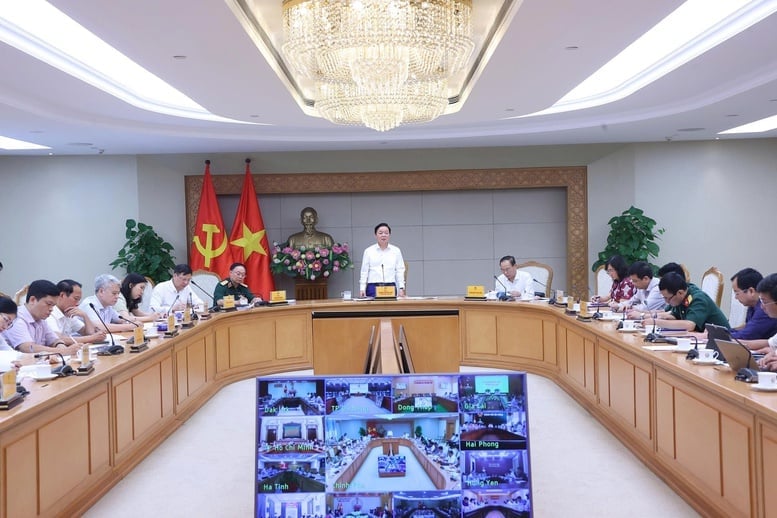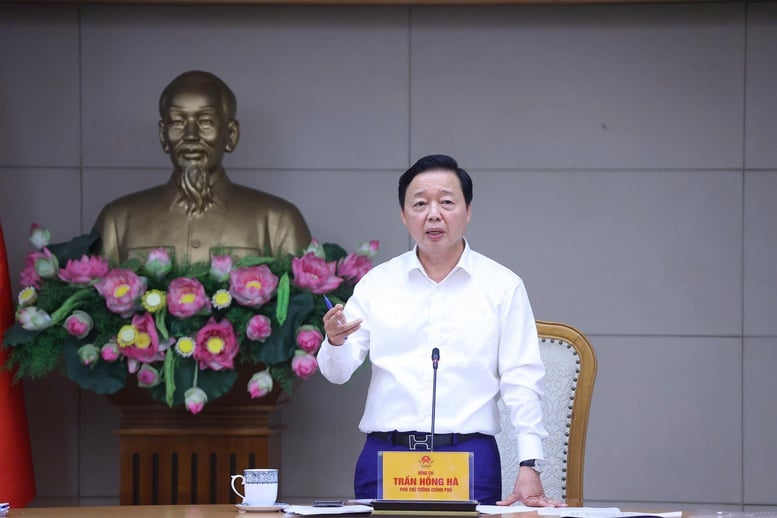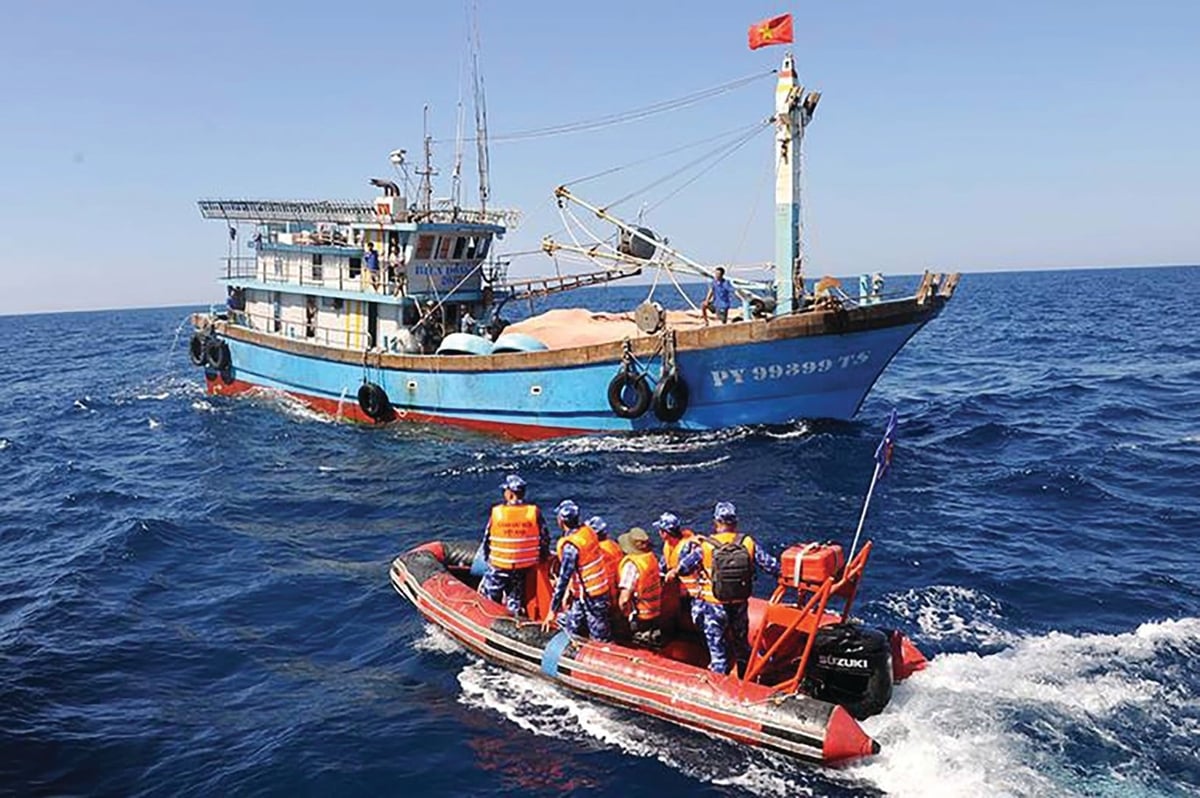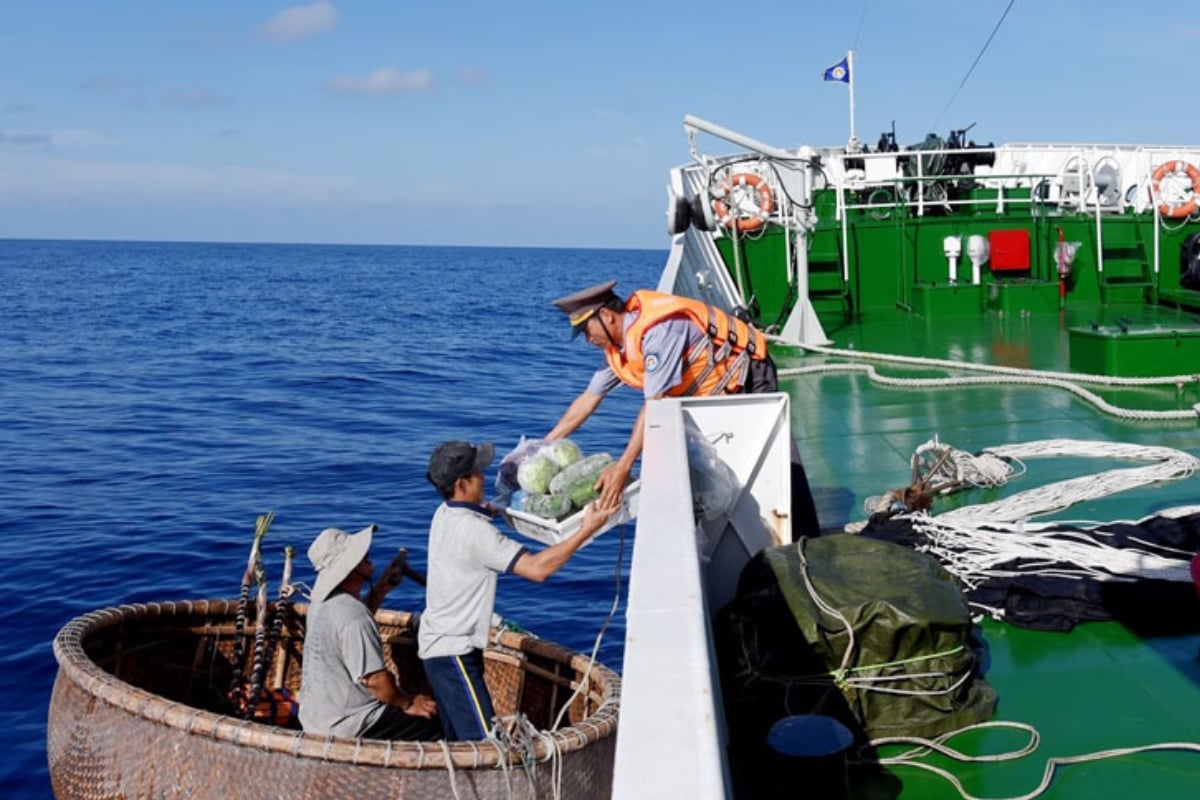November 20, 2025 | 03:39 GMT +7
November 20, 2025 | 03:39 GMT +7
Hotline: 0913.378.918
November 20, 2025 | 03:39 GMT +7
Hotline: 0913.378.918
On August 1, Deputy Prime Minister Tran Hong Ha chaired a conference of the National Steering Committee on the situation and outcomes of combating illegal, unreported, and unregulated (IUU) fishing, which was connected online with coastal provinces and cities across the country.

Deputy Prime Minister Tran Hong Ha chaired the conference of the National Steering Committee on the situation and outcomes of combating illegal, unreported, and unregulated (IUU) fishing. Photo: VGP/Dinh Nam.
Reporting at the meeting, Deputy Minister of Agriculture and Environment Phung Duc Tien said that as of June 30, 2025, more than 81,700 fishing vessels nationwide had been registered and updated in the national fisheries database (VNFishbase). Localities are reviewing, compiling, updating, and synchronizing fishing vessel data with the national population database; some provinces, such as An Giang and Ca Mau, have completed the identification process for fishing vessels. They have also developed monitoring lists to track and control vessels that are not eligible for fishing activities.
Currently, more than 28,100 fishing vessels measuring 15 meters or more in length have been equipped with Vessel Monitoring Systems (VMS), reaching a coverage rate of over 99%.
Each week, local authorities review and update the list of fishing vessels at high risk of IUU fishing violations based on VMS data, so that relevant agencies can focus on inspection, monitoring, and handling of violations (if any).
On a daily basis, the Ministry of Agriculture and Environment provides localities with lists of fishing vessels operating near maritime boundaries or losing VMS connection near foreign waters. This enables authorities to monitor, contact vessel owners and captains, and issue warnings to prevent IUU fishing violations and boundary crossings.
As of June 30, 2025, among vessels 24 meters or longer, there were over 3,000 instances of VMS disconnection lasting more than six hours involving 619 vessels; 24 instances involving 21 vessels with VMS disconnection exceeding 10 days at sea; and four instances of boundary violations involving four vessels. The number of fishing vessels and crew members detained and handled by foreign authorities decreased by 20 vessels and 129 fishermen compared to the same period last year.
The electronic catch documentation and traceability system (eCDT) has been implemented at 94 fish landing sites, an increase of 32 sites compared to the same period in 2024. From the beginning of the year to June 30, 2025, there were over 95,800 port departures involving 25,759 vessels, and more than 90,100 port arrivals involving 23,407 vessels. The total volume of seafood landed through ports exceeded 280,000 tons.

The Deputy Prime Minister emphasized that the entire system must undergo a fundamental shift in mindset and approach in order to address the root causes of IUU violations. Photo: VGP/Dinh Nam.
According to Deputy Minister Phung Duc Tien, relevant authorities are making efforts to strictly sanction violations related to illegal fishing in foreign waters. However, the number of sanctions imposed on vessels disconnecting VMS signals at sea or crossing the permitted maritime boundary remains low compared to the number of violations detected. Moreover, the updating of IUU violation penalties into the administrative sanction database for the fisheries sector, as required by local regulations, is still incomplete and not timely.
"Vietnam has the opportunity to have the EC’s 'yellow card' warning lifted if anti-IUU efforts are consistently maintained and serious violations, such as operating in foreign waters, crossing boundaries, and disconnecting VMS devices, are strictly dealt with," Deputy Minister Phung Duc Tien stated.
In his closing remarks, Deputy Prime Minister Tran Hong Ha emphasized that implementing anti-IUU fishing measures is not only about having the EC’s “yellow card” lifted, but more importantly, about ensuring the sustainable development of Vietnam’s fisheries sector, protecting marine resources, and safeguarding the long-term livelihoods of fishermen.

The Phu Yen Provincial People’s Committee, in coordination with the Command of Coast Guard Region 2, organized patrols and inspections of fishing vessels to enforce fisheries laws at sea. Photo: Huong Giang.
According to the Deputy Prime Minister, Vietnam already has a legal framework on fisheries, environmental protection, and marine conservation; however, the problem lies in implementation, which remains superficial, reactive, and lacking in substance. He therefore requested the Ministry of Agriculture and Environment to review and improve relevant legal documents, particularly by amending three key decrees related to offshore fishing support policies and administrative sanctions. The laws and regulations must be strong, clear, and ensure full decentralization to local authorities in vessel management, port inspections, and handling of violations. The scope of legal accountability should also be expanded to include processing and trading enterprises. Penalties must be transparent, timely, and clearly decentralized to avoid the shifting of responsibility.
The Deputy Prime Minister emphasized the urgent need to quantify and measure the implementation of IUU combat objectives: ensuring there are no vessels violating foreign waters, establishing a complete vessel monitoring system, and protecting fishing grounds and fishermen’s livelihoods.
Ministries and sectors must review all procedures, clearly define responsibilities and authority, and establish a post-inspection mechanism. “There must be clear, legally grounded directives that are strictly followed by all relevant forces,” the Deputy Prime Minister stated, stressing the need to avoid a situation where “no one is held accountable even when violations occur,” and to shift away from the mindset that “issuing numerous documents equates to fulfilling duties.”
The Ministry of Agriculture and Environment and the Ministry of Public Security were tasked with jointly developing regulations mandating the installation of dashcams on fishing vessels, especially for transshipment and offshore fishing activities. “Every activity of a fishing vessel must be monitored, from the moment it departs the port, throughout its journey, catch volume, until it returns and unloads at port,” he emphasized.

Fisheries surveillance forces stand side by side with fishermen in safeguarding the seas. Photo: Minh Ly.
Emphasizing that digital transformation is a key pillar for monitoring, traceability, and fishing vessel management, the Deputy Prime Minister called for the integration of multi-purpose data systems, including VMS, electronic logbooks, population databases, port inspections, satellite data, and AIS positioning. The database must support two-way interaction, early warnings, route tracking, and the application of artificial intelligence and blockchain to ensure information security and verification. Vessel monitoring should not only serve the purpose of “penalizing violations,” but also “guiding, alerting, and supporting” fishermen.
Vietnam’s regulatory and technical agencies are encouraged to proactively cooperate with international organizations to learn from global experiences and access technological solutions - to “learn fast, act fast, and act right” by adopting successful models.
The Deputy Prime Minister tasked the Ministry of National Defense with combining national defense duties and the responsibility of monitoring fishing activities, particularly in overlapping and border maritime zones where IUU violations frequently occur. Coast guard, border guard, and fisheries surveillance forces must coordinate with local authorities, designate a clear lead agency, and take specific responsibility - putting an end to the situation where “violations occur but no one knows who is in charge of enforcement” - through a clear command and coordination mechanism.
He also urged local governments to develop concrete projects for occupational transition and livelihood support for fishermen. This includes thoroughly assessing the number of affected individuals, their current conditions, capital needs, training requirements, and potential alternative livelihoods, from marine aquaculture and environmental restoration to eco-tourism and fisheries logistics services. This is not only an economic responsibility but also a matter of social welfare and stability.
At the conference, representatives from various localities emphasized the need to strictly handle deliberate violations, such as tampering with or disconnecting Vessel Monitoring Systems (VMS), and to intensify the prosecution of eligible cases to enhance deterrence.
Provinces also proposed clearer decentralization and greater autonomy in developing specific projects tailored to their local conditions, particularly in the planning of fishing ports, fishing zones, and fleet management.
The Deputy Prime Minister acknowledged these recommendations and stressed: “The central government provides strategic direction, but it is the responsibility of local authorities to take the initiative in developing and implementing livelihood transition projects.” He also instructed localities to submit concrete project proposals based on the planning of fishing ports, designated fishing areas, and allocated fishing grounds, with the ultimate goal of ensuring the sustainable protection of fishery resources.
Translated by Phuong Linh

(VAN) On November 18, Deputy Prime Minister Tran Hong Ha chaired the 22nd session of the National Steering Committee on Anti-IUU Fishing.

(VAN) Prime Minister Pham Minh Chinh has issued an official dispatch directing focused response efforts and the swift remediation of damage caused by recent floods in the Central region.

(VAN) Deputy Minister Nguyen Thi Phuong Hoa calls for prioritizing the livelihoods of coastal residents, particularly those impacted by marine economic development projects.

(VAN) People can now submit their land-use right certificates ('red books') via the VNeID application. This marks an essential step toward fully paperless public services in land administration in the near future.

(VAN) Fishermen and authorities in Khanh Hoa province are demonstrating strong resolve in the fight against IUU fishing, aiming to develop a sustainable fisheries sector and remove the European Commission's (EC) ‘yellow card.’

(VAN) Viet Nam has declared that it will develop and implement strong greenhouse gas reduction measures to achieve Net Zero emissions by 2050 and it is following through on that commitment.

(VAN) A comprehensive legal framework, tailored to domestic conditions, serves as the foundation guiding economic sectors toward low-emission development.